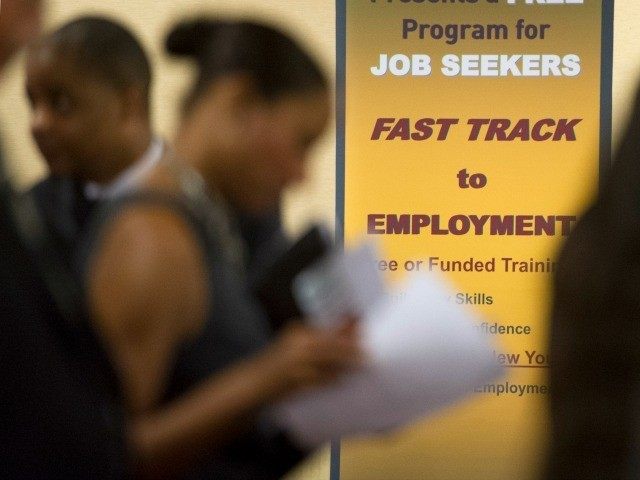Friday, the Labor Department is expected to report the economy added 220,000 jobs in April and push the Federal Reserve toward raising interest rates.
A harsh winter, West Coast port strike, stronger dollar and less drilling for oil and gas pushed down first quarter GDP growth to near zero, and the Fed will be looking at the jobs report for signs the recovery is again firming.
Forecasters have lowered GDP estimates for the balance of 2015, because the full impact of a stronger dollar—boosting imports and curbing exports and domestic manufacturing— has not fully played out. And consumers have so far been reluctant to spend the windfall in real incomes afforded by lower gasoline prices.
U.S. oil prices have recovered to about $60 per barrel from a March low of $44, creating the worst of conditions. Still off from their June high of $108 a barrel, oil prices are not up enough to rekindle investment in the oil patch but gasoline prices have increased about 60 cents a gallon—enough to keep consumers, though still richer than last summer, reluctant to stage a spring shopping spree.
GDP growth should be about 2 percent in the second quarter and accelerate to about 2.5 to 2.7 percent the balance of the year.
About 220,000 jobs a month—well below the 260,000 averaged in 2014—may be about as good as we can expect, but still enough to gradually push the unemployment rate below 5 percent by next year.
Wages are starting to rise. Recent anecdotal reports of employers such as Aetna, Starbucks, GAP, and Hobby Lobby boosting wages now have been confirmed by broader indicators of first quarter wage acceleration—in particular, Labor Department’s closely-watched Employment Cost Index.
The 7 million men neither employed nor looking for work are not likely to join the labor force in large numbers anytime soon. Many lack the skills needed to find decent paying jobs in a rapidly changing economy and in recent years, easier access to federal disability benefits, food stamps and Medicaid have reduced incentives to work.
For low income couples, if one spouse has maintained reasonably steady employment through the economic recovery, the potential loss of the Earned Income Tax Benefit, coupled with the potential loss of the abovementioned benefits, can raise effective marginal taxes enough to discourage the second spouse from working.
The secular rise in female labor force participation has leveled off, and more Baby Boomers have reached retirement age.
Consequently, the adult labor force participation rate keeps falling, tightening the labor supply to the point that only moderate jobs growth may be needed to boost wages significantly. Finally, that seems to be happening.
Meanwhile measures of core inflation—consumer prices net of volatile energy and food prices—have firmed in recent months and are approaching the Fed target of 2 percent a year. And history has taught economists that once inflation accelerates, it is very difficult to contain, strengthening the hand of hawks among Fed policymakers.
Overall, Chairwoman Yellen may well become quite happy with jobs gains of 200,000 a month or even less, because anything above 100,000 may prove enough to gradually lower the headline unemployment rate to less than 5 percent and boost wages and inflation in line with Fed targets.
Still, raising interest rates—likely not in June but perhaps by September—to moderate inflation entails great risks.
The appreciation of the dollar has taken a big bite out of U.S. growth, and increasing U.S. interest rates—when central banks in Europe, Japan and China have sharply eased monetary policy—risks pushing the dollar up even further and end the U.S. economic recovery altogether.
Jobs growth in range of 200,000 a month could push Fed policymakers to risk a recession to keep inflation in check.
Peter Morici is an economist and business professor at the University of Maryland, national columnist. He tweets @pmorici1.

COMMENTS
Please let us know if you're having issues with commenting.